2024届高考英语构词法及单词记忆课件(共65张PPT)
文档属性
| 名称 | 2024届高考英语构词法及单词记忆课件(共65张PPT) |

|
|
| 格式 | ppt | ||
| 文件大小 | 969.0KB | ||
| 资源类型 | 教案 | ||
| 版本资源 | 人教版(2019) | ||
| 科目 | 英语 | ||
| 更新时间 | 2024-02-27 08:38:45 | ||
图片预览


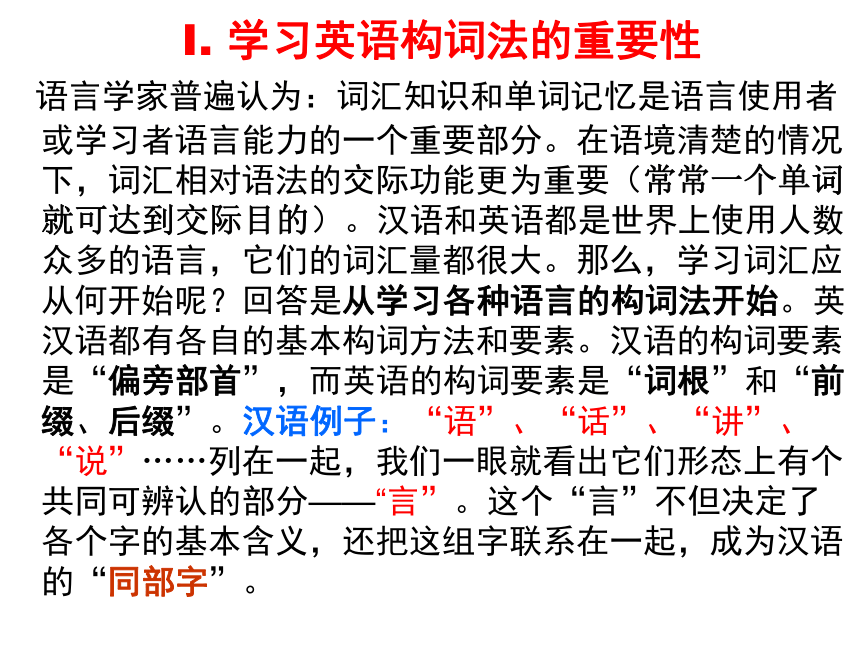
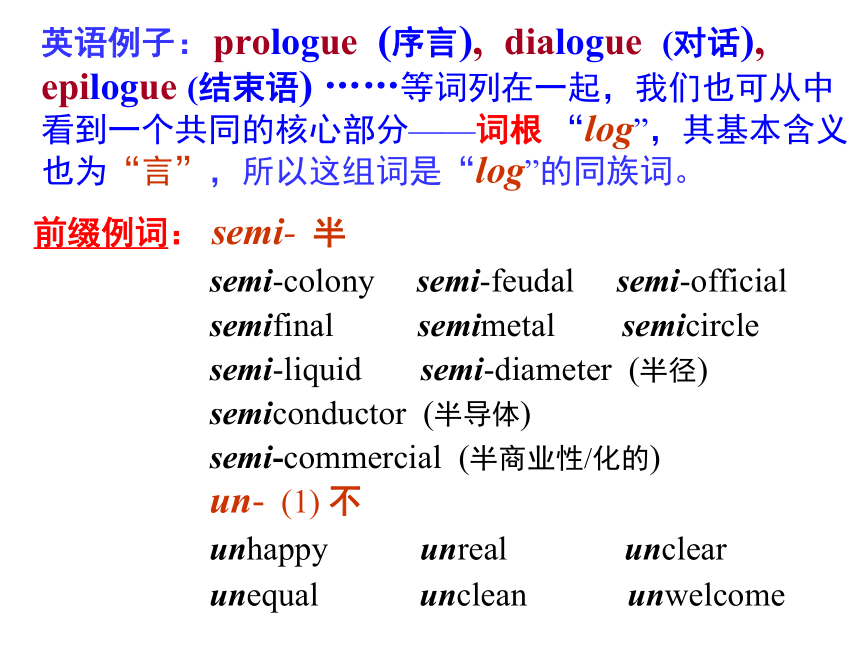
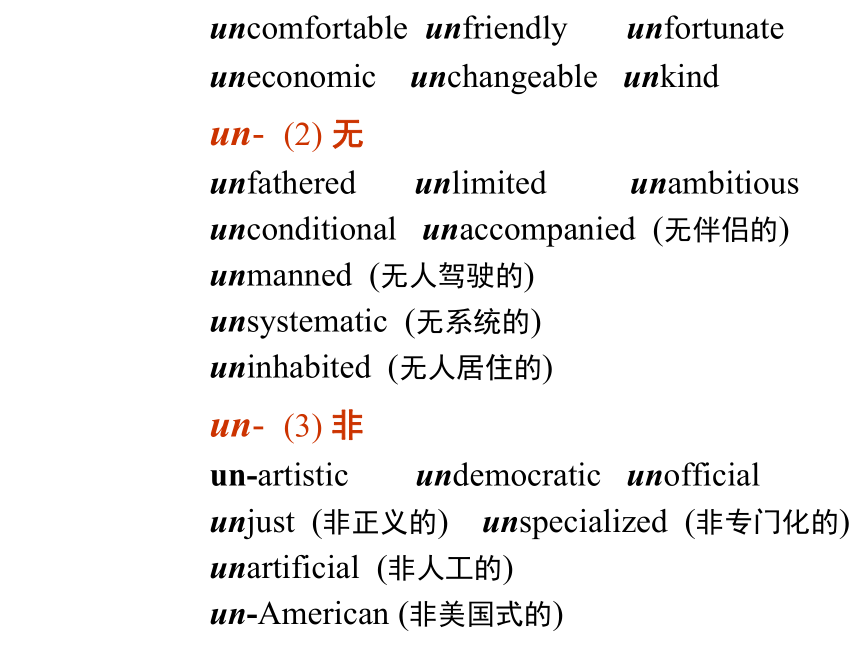
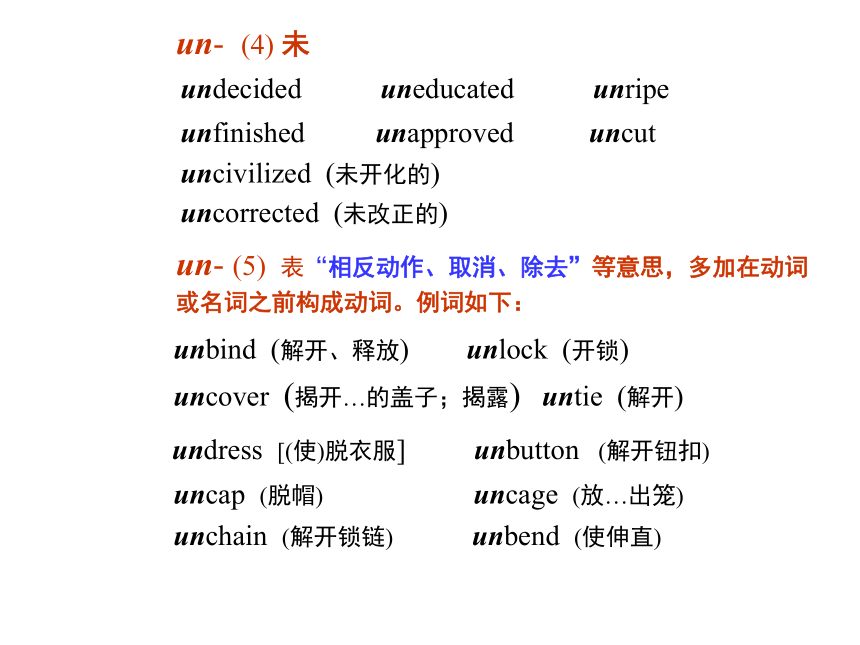
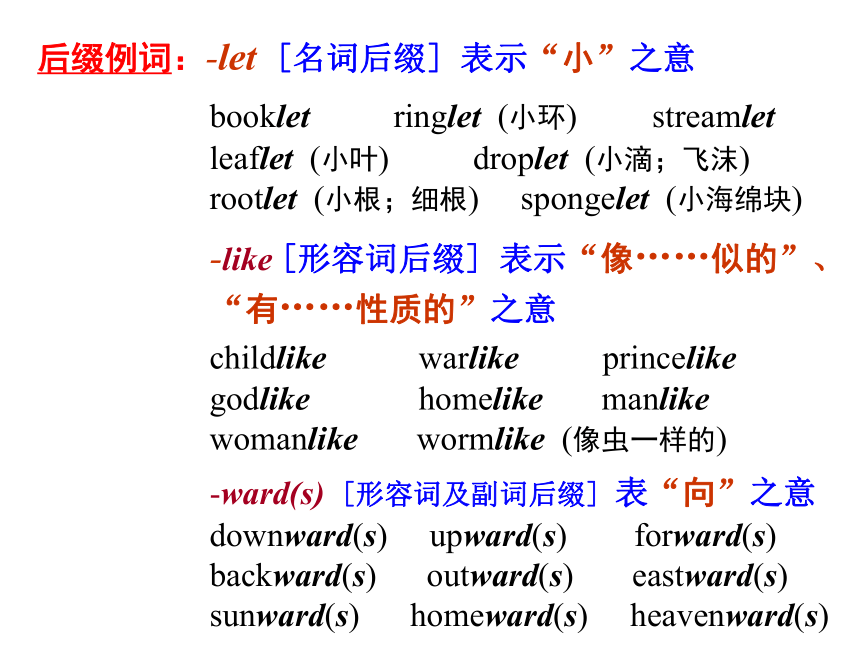
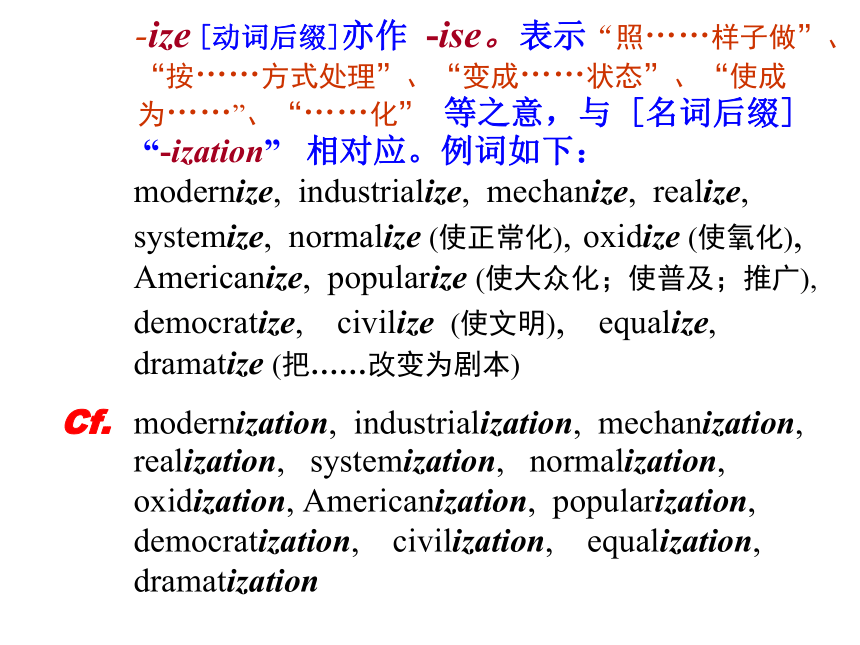
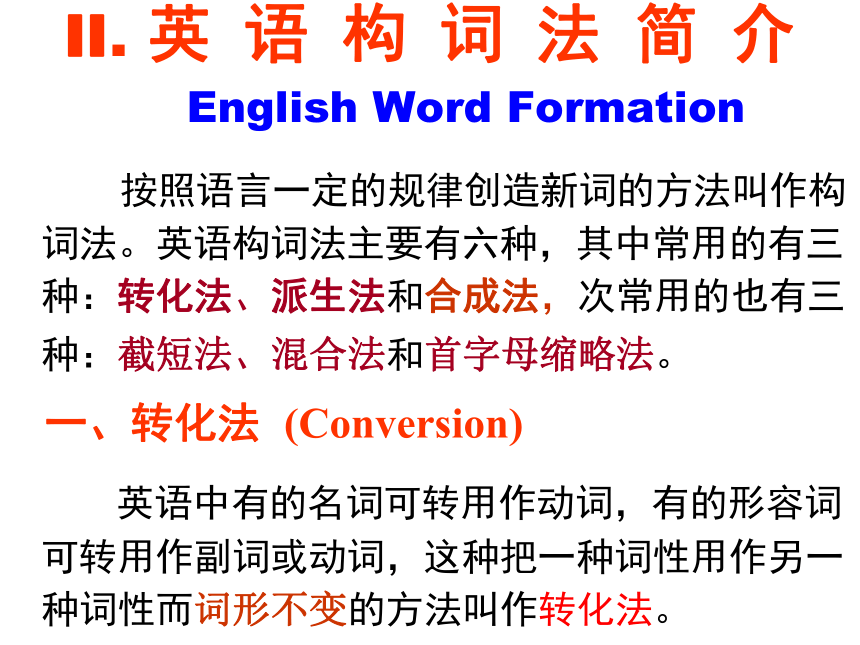
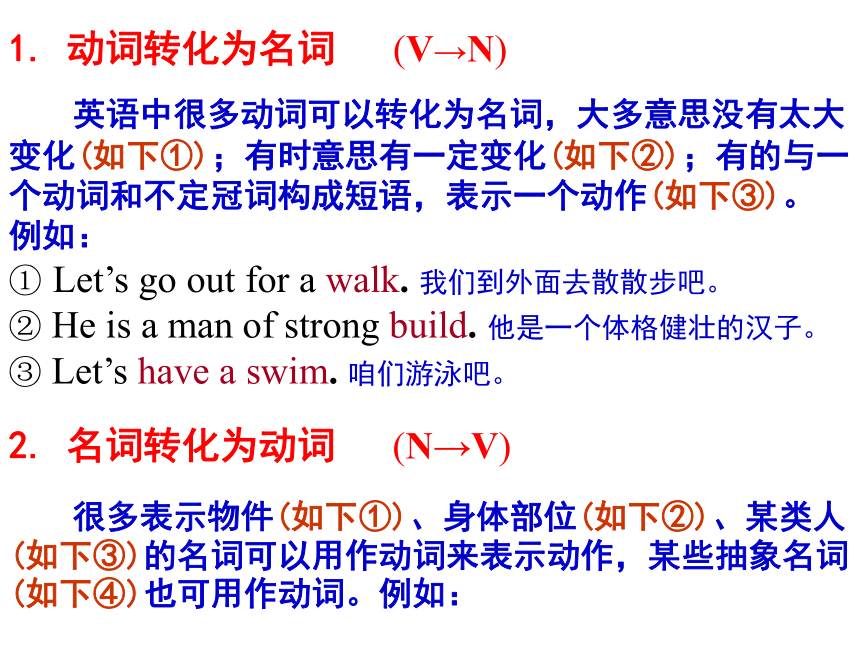
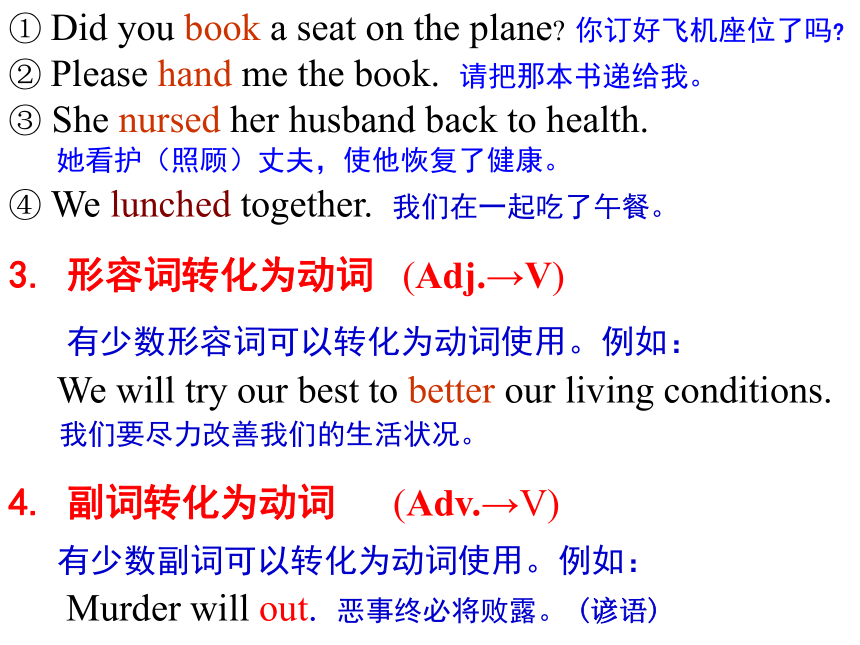
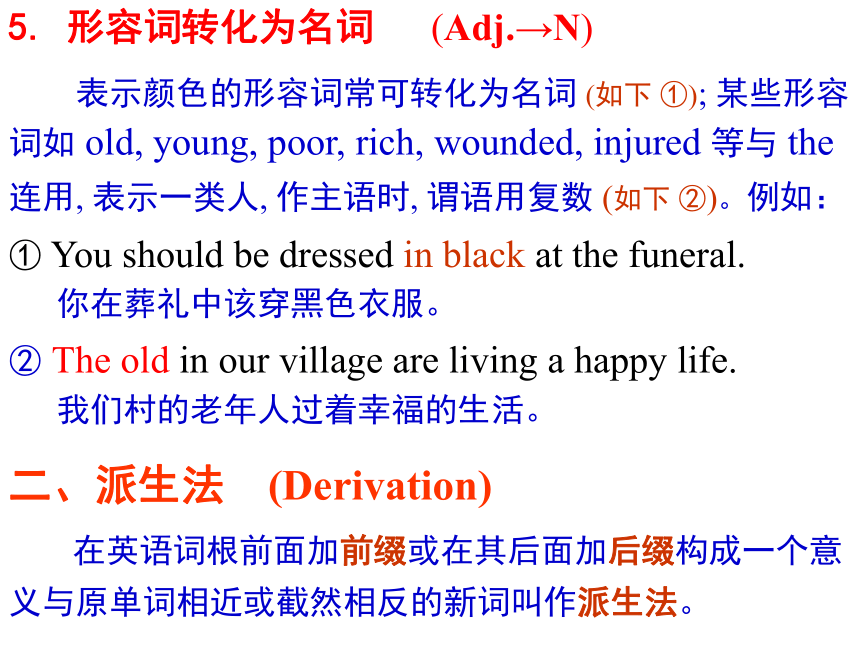
文档简介
(共65张PPT)
英语语法
专题系列讲座
第 一 讲
英语构词法
及 单词记忆
I. 学习英语构词法的重要性
语言学家普遍认为:词汇知识和单词记忆是语言使用者或学习者语言能力的一个重要部分。在语境清楚的情况下,词汇相对语法的交际功能更为重要(常常一个单词就可达到交际目的)。汉语和英语都是世界上使用人数众多的语言,它们的词汇量都很大。那么,学习词汇应从何开始呢?回答是从学习各种语言的构词法开始。英汉语都有各自的基本构词方法和要素。汉语的构词要素是“偏旁部首”,而英语的构词要素是“词根”和“前缀、后缀”。汉语例子:“语”、“话”、“讲”、“说”……列在一起,我们一眼就看出它们形态上有个共同可辨认的部分——“言”。这个“言”不但决定了各个字的基本含义,还把这组字联系在一起,成为汉语的“同部字”。
英语例子:prologue (序言), dialogue (对话), epilogue (结束语) ……等词列在一起,我们也可从中看到一个共同的核心部分——词根 “log”,其基本含义也为“言”,所以这组词是“log”的同族词。
前缀例词: semi- 半
semi-colony semi-feudal semi-official
semifinal semimetal semicircle
semi-liquid semi-diameter (半径)
semiconductor (半导体)
semi-commercial (半商业性/化的)
un- (1) 不
unhappy unreal unclear
unequal unclean unwelcome
uncomfortable unfriendly unfortunate
uneconomic unchangeable unkind
un- (2) 无
unfathered unlimited unambitious
unconditional unaccompanied (无伴侣的)
unmanned (无人驾驶的)
unsystematic (无系统的)
uninhabited (无人居住的)
un- (3) 非
un-artistic undemocratic unofficial
unjust (非正义的) unspecialized (非专门化的)
unartificial (非人工的)
un-American (非美国式的)
un- (4) 未
undecided uneducated unripe
unfinished unapproved uncut
uncivilized (未开化的)
uncorrected (未改正的)
un- (5) 表“相反动作、取消、除去”等意思,多加在动词
或名词之前构成动词。例词如下:
unbind (解开、释放) unlock (开锁)
uncover (揭开…的盖子;揭露) untie (解开)
undress [(使)脱衣服] unbutton (解开钮扣)
uncap (脱帽) uncage (放…出笼)
unchain (解开锁链) unbend (使伸直)
后缀例词:-let [名词后缀] 表示“小”之意
booklet ringlet (小环) streamlet
leaflet (小叶) droplet (小滴;飞沫)
rootlet (小根;细根) spongelet (小海绵块)
-like [形容词后缀] 表示“像……似的”、
“有……性质的”之意
childlike warlike princelike
godlike homelike manlike
womanlike wormlike (像虫一样的)
-ward(s) [形容词及副词后缀] 表“向”之意
downward(s) upward(s) forward(s)
backward(s) outward(s) eastward(s)
sunward(s) homeward(s) heavenward(s)
-ize [动词后缀]亦作 -ise。表示“照……样子做”、
“按……方式处理”、“变成……状态”、“使成
为……”、“……化” 等之意,与 [名词后缀]
“-ization” 相对应。例词如下:
modernize, industrialize, mechanize, realize,
systemize, normalize (使正常化), oxidize (使氧化),
Americanize, popularize (使大众化;使普及;推广),
democratize, civilize (使文明), equalize,
dramatize (把……改变为剧本)
Cf. modernization, industrialization, mechanization,
realization, systemization, normalization,
oxidization, Americanization, popularization,
democratization, civilization, equalization,
dramatization
II. 英 语 构 词 法 简 介
English Word Formation
按照语言一定的规律创造新词的方法叫作构词法。英语构词法主要有六种,其中常用的有三种:转化法、派生法和合成法,次常用的也有三种:截短法、混合法和首字母缩略法。
一、转化法 (Conversion)
英语中有的名词可转用作动词,有的形容词可转用作副词或动词,这种把一种词性用作另一种词性而词形不变的方法叫作转化法。
1. 动词转化为名词 (V→N)
英语中很多动词可以转化为名词,大多意思没有太大变化(如下①);有时意思有一定变化(如下②);有的与一个动词和不定冠词构成短语,表示一个动作(如下③)。
例如:
① Let’s go out for a walk. 我们到外面去散散步吧。
② He is a man of strong build. 他是一个体格健壮的汉子。③ Let’s have a swim. 咱们游泳吧。
2. 名词转化为动词 (N→V)
很多表示物件(如下①)、身体部位(如下②)、某类人(如下③)的名词可以用作动词来表示动作,某些抽象名词(如下④)也可用作动词。例如:
① Did you book a seat on the plane 你订好飞机座位了吗
② Please hand me the book. 请把那本书递给我。
③ She nursed her husband back to health.
她看护(照顾)丈夫,使他恢复了健康。
④ We lunched together. 我们在一起吃了午餐。
3. 形容词转化为动词 (Adj.→V)
有少数形容词可以转化为动词使用。例如:
We will try our best to better our living conditions.
我们要尽力改善我们的生活状况。
4. 副词转化为动词 (Adv.→V)
有少数副词可以转化为动词使用。例如:
Murder will out. 恶事终必将败露。 (谚语)
5. 形容词转化为名词 (Adj.→N)
表示颜色的形容词常可转化为名词 (如下 ①); 某些形容词如 old, young, poor, rich, wounded, injured 等与 the
连用, 表示一类人, 作主语时, 谓语用复数 (如下 ②)。例如:
① You should be dressed in black at the funeral.
你在葬礼中该穿黑色衣服。
② The old in our village are living a happy life.
我们村的老年人过着幸福的生活。
二、派生法 (Derivation)
在英语词根前面加前缀或在其后面加后缀构成一个意
义与原单词相近或截然相反的新词叫作派生法。
1. 前缀 (prefixes)
英语前缀的使用多改变词义而不改变词性(后缀的使用一般改变词类而不改变基本词义)。
(1) 表示否定意义的前缀常用的有 dis-, il-, im-, in-, ir-, mis-, non-, un- 等, 在单词的前面加这类前缀常构成与该词意义相反的新词。例如:
appear (出现)→disappear (消失)
correct (正确的)→incorrect (不正确的)
lead (带领)→mislead (领错, 误领)
stop (停下)→non-stop (不停)
(2) 表示其他意义的前缀常用的有 a- (多构成表语形容词); anti- (反对; 抵抗), auto- (自动); co- (共同); en- (使); inter- (互相); re- (再; 又); sub- (下面的; 次; 小); tele- (表示距离)等。例词:
alone (单独的)
antigas (防毒气的)
autochart (自动图表)
cooperate (合作)
enjoy (使高兴)
internet (互联网)
reuse (再用)
subway (地铁)
telephone (电话)
2. 后缀 (suffixes)
英语单词不仅可以通过加前缀构成新词,也可加后缀构成新词。后缀通常改变单词的词性,构成意义相近的其他词性;少数后缀还会改变词义,变为与原来词义相反的新词。
(1) 构成名词的后缀常用的有-ence, -(e)r/-or (从事 某事的人), -ese (某地人), -ess (雌性), -ful ,-ian (精通……的人),-ist (专业人员),-ment (性质;状态),-ness (性质;状态),-tion (动作;过程) 等。例如:
differ(不同于)→ difference(区别)
write(写)→ writer(作家)
Japan(日本)→ Japanese (日本人)
act(表演)→ actress(女演员)
mouth(口)→ mouthful(一口)
music(音乐)→ musician(音乐家)
(2) 构成动词的后缀常用的有-(e)n (多用于形容词之后),-fy (使……化),-ize (使……成为)。例如:
wide → widen(加宽)
beauty → beautify(美化)
pure → purify (提纯)
real → realize(意识到)
organ → organize(组织)
(3) 构成形容词的后缀常用的有-al,-able (有能力的),-(a)n (某国人的),-en (多用于表示材料的名词后),-ern (方向的),-ese (某国人的),-ful,-(ic)al,-ish,-ive,
-less (表示否定),-like (像……的),-ly,-ous,-some,
-y (表示天气)等。例如:
nature → natural(自然的)
reason → reasonable(有道理的)
America → American(美国的)
China → Chinese【中国(人)的】
gold → golden(金的)
east → eastern(东方的)
child → childish(孩子气的)
snow → snowy(雪的)
(4) 构成副词的常用后缀有-ly (主要用于形容词之后表示方式或程度),-ward(s) (主要用于表示方位的词之后表示方向)。例如:
angry → angrily(生气地)
to → towards(朝/向……)
east → eastward(向东)
(5) 用以构成数词的后缀有-teen (十几),-ty (几十),
-th (构成序数词)。例如:
six → sixteen(十六)→ sixteenth(第十六)
four→ forty(四十)→ fortieth(第四十)
三、合成法 (Composition)
合成法即将两个(偶尔三个或更多个)单词连在一起合成一个新词,前一个词修饰或限定后一个词。
1. 合成名词
名词+名词 weekend (周末)
名词+动词 daybreak (黎明)
名词+动名词 handwriting(书法)
名词+及物动词+er/or pain-killer (止痛药)
名词+介词+名词 editor-in-chief (总编辑)
代词+名词 she-wolf (母狼)
动词+名词 typewriter (打字机)
动名词+名词 reading-room (阅览室)
现在分词+名词 flying-fish (飞鱼)
形容词+名词 gentleman (绅士)
副词+动词 outbreak (爆发)
介词+名词 afternoon (下午)
2. 合成形容词
数词+名词 one-way(单行的)
名词+形容词 snow-white(雪白的)
名词+现在分词 English-speaking(讲英语的)
名词+to+名词 face-to-face (面对面的)
名词+过去分词 man-made(人造的)
数词+名词+形容词 two-year-old(两岁的)
数词+名词+ed five-storeyed(五层的)
动词+副词 see-through(透明的)
形容词+名词 high-class(高级的)
形容词+名词+ed noble-minded(高尚的)
形容词+形容词 light-blue(浅蓝色的)
形容词+现在分词 good-looking(相貌好看的)
副词+形容词 ever-green(常青的)
副词+现在分词 hard-working(勤劳的)
副词+过去分词 well-known(著名的)
副词+名词 fast-food(专门提供快餐服务的)
介词+名词 downhill(下坡的)
3.合成动词
名词+动词 sleep-walk(梦游)
形容词+动词 white-wash(粉刷)
副词+动词 overthrow(推翻)
4.合成副词
形容词+名词 hotfoot(匆忙地)
形容词+副词 everywhere(到处)
副词+副词 however(尽管如此)
介词+名词 beforehand(事先)
介词+副词 forever(永远)
5.合成代词
代词宾格+self herself (她自己)
物主代词+self myself (我自己)
形容词+名词 anything (任何东西)
6.合成介词
介词+名词 inside(在……里面)
介词+副词 within(在……之内)
副词+介词 into(进入)
四、截短法/缩略法 (Clipping)
截短法,即将单词缩写,词义和词性保持不变,主要有截头、去尾、截头去尾等形式。
1. 截头 telephone→phone aeroplane→plane
omnibus→bus
2. 去尾 mathematics→maths
co-operate→co-op
examination→exam
kilogram→kilo laboratory→lab
taxicab→taxi
3. 截头去尾 influenza→flu
refrigerator→fridge
prescription→script
五、混合法 (Blending)
混合法,即将两个词各取一部分紧缩成一个新词。例如:
smoke + fog→smog 烟雾
breakfast + lunch→brunch 早午餐/晚早餐
boat + hotel →boatel 水上旅馆
motor + hotel→motel 汽车旅馆
有时,使用混合法构成的新词,意义上前半部分表示属性,后半部分表示主体。例词:
news broadcast→newscast 新闻广播
television broadcast→telecast 电视播送
helicopter + airport→heliport 直升飞机场
六、首字母缩略法 (Acronym)
首字母缩略法,即截取相关单词的首字母组成一个新
词。通常有两种读音形式:(1) 按组成该缩略词的字母一
一读出;(2) 作为一个单词拼读:
(1) very important person→VIP 要人; 大人物
television→TV 电视
China Central Television→CCTV 中央电视台
PowerPoint Text→PPT 电子课件
(2) Test of English as a Foreign Language→TOEFL
light amplification by stimulated emission of radiation→
laser 激光
Asia-Pacific Economic Cooperation→APEC 亚太经合组织
United Nations Educational, Scientific, and Cultural
Oaganizations→UNESCO 联合国教科文组织
The following two sections are of very important practical use. Yet we do not have enough time to go over them in class. So they are left for you to learn and memorize after class.
(随后两节的内容具有非常重要的实用价值,但我们没有足够时间在课堂上学习讲解,就留给大家课后去学习和背记。)
III. 学点构词法
掌握一些英语构词法,对单词的记忆和理解有很大的帮助,下面笔者列举一些常用的词缀和词根。
一、常见的前缀
1. 表示否定意义的前缀
纯否定前缀 a-, an-: asymmetry (不对称);
anhydrous (无水的)
dis-: dishonest, dislike
in-, ig-, il-, im-, ir-: incapable, inability, ignoble,
impossible, immoral, illegal, irregular
n-: none, neither, never
non-: nonsense
neg-: neglect
un-: unable, unemployment
(2) 表示错误的意义 male-, mal-
malfunction, maladjustment (失调)
mis-
mistake, mislead
pseudo-
pseudonym (假名), pseudoscience
(3) 表示反动作的意思
de-
defend, demodulation (解调)
dis-,
disarm, disconnect
un-, unload, uncover
(4) 表示相反,相互对立意思 anti-, ant-: antiknock (防震),
antiforeign (排外的)
contra-, contre-, contro-: contradiction, controflow (逆流)
counter-, counter reaction, counterbalance
ob-, oc-, of-, op-: object, oppose, occupy
with-: withdraw, withstand
2. 表示空间位置,方向关系的前缀
(1) a- 表示“在……之上”,“向……” aboard, aside,
(2) by- 表示“附近,邻近,边侧”
bypath, bypass (弯路)
(3) circum-, circu-, 表示“周围,环绕,回转”
circumstance, circuit
(4) de-, 表示“在下,向下” descend, degrade
(5) en-, 表示“在内,进入” encage, enbed (上床)
(6) ex-, ec-, es-, 表示“外部,外” exit, eclipse, expand,
export
(7) extra-, 表示“额外” extraction (提取)
(8) fore- 表示“在前面” forehead, foreground
(9) in-, il-, im-, ir-, 表示“向内,在内,背于”
inland, invade, inside, import
(10) inter-, intel-, 表示“在……间,相互” international,
interaction, internet
(11) intro-, 表示“向内,在内,内侧”
introduce, introduce
(12) medi-, med-, mid-, 表示“中,中间” Mediterranean,
midposition
(13) out-, 表示“在上面,在外部,在外” outline, outside,
outward
(14) over-, 表示“在上面,在外部,向上” overlook,
overhead, overboard
(15) post-, 表示“向后在后边;次” postscript (附言)
(16) pre-, 表示“在前”在前面” prefix, preface, preposition
(17) pro-, 表示“在前,向前” progress, proceed,
(18) sub-, suc-, suf-, sug-, sum-, sup-, sur-, sus-, 表示 “在下
面,下” subway, submarine, suffix, suppress,
supplement
(19) super-, sur-, 表示“在…..之上” superficial, surface,
superstructure
(20) trans-, 表示 “移上,转上,在那一边” translate,
transform, transoceanic
(21) under-, 表示“在…..下面,下的” underline,
underground, underwater
(22) up-, 表示 “向上, 向上面” upward, uphold, uphill (上坡)
3. 表示时间,序列关系的前缀
(1) ante-, anti-, 表示 “先前,早于,预先” antecedent,
anticipate,
(2) ex-, 表示 “先,故,旧” ex-president, ex-husband
(3) fore-, 表示 “在前面,先前,前面” foreward, forecast,
foretell (预言)
(4) mid-, medi-, 表示 “中间” midnight, midsummer
(5) post-, 表示 “在后,后” postwar,
(6) pre-, pri-, 表示“在前,事先,预先”
preheat, prewar, prehistory
(7) pro-, 表示 “在前,先,前” prologue (序幕),
prophet (预言家)
(8) re-, 表示 “再一次,重新” retell, rewrite
4. 表示比较程度差别关系的前缀
(1) by-, 表示 “副,次要的” byproduct, by-work (副业)
(2) extra-,表示 “超越,额外” extraordinary,
(3) hyper- 表示 “超过,极度” hypersonic (超声波),
hypertension (高血压; 高压)
(4) out-,表示 “超过,过分”
outdo (超过), outbid(出价过高的人)
(5) over-,表示“超过,过度,太” overeat, overdress,
oversleep
(6) sub-, suc-, sur-, 表示“低,次,副,亚”
subeditor, subordinate, subtropical(亚热带)
(7) super-, sur- 表示“超过” supernature, superpower,
surplus, surpass
(8) under-,表示“低劣,低下”
undersize, undergrown, underproduction (生产不足)
(9) vice- 表示“副,次” vicepresident, vicechairman
5. 表示共同,相等意思的前缀
(1) com-, cop-, con-, cor-, co- 表示“共同,一起”。
connect, combine, collect, combat, coexist,
co-operate
(2) syn-, syl-,sym-,表示“同,共,和,类”
symmetry, sympathy, synthesis (合成)
6. 表示整个完全意思的前缀
(1) al- 表示“完整,完全” alone, almost,
(2) over-表示“完全,全” overall, overflow (充满)
(3) pan-表示“全,总,万” panentheism (泛神论),
panorama
7. 表示分离,离开意思的前缀
1) a- ab-, abs-, 表示“分离,离开”
away, apart, abstract, abstain
2) de- 表示“离去,处去” depart, decolour,
3) dis-, di-, dif-, 表示“分离,离开” divorce,
disarm (缴械)
4) ex-, e-, 表示“离开,分离” expel, exclude,
expatriate(驱出国外)
5) for- 表示“离开,脱离” forget, forgive
6) 表示“离开” release, resolve
7) 表示“分离,隔离” separate, seduce, select
8. 表示通过,遍及意思的前缀
1) dia-,表示“通过,横过” diameter, diagram,
2) per-, pel-, 表示“通,总,遍” perfect, perform, pervade(浸透)
3) trans-, 表示“横过,贯通” transparent, transmit, transport
9. 表示加强意思的前缀 a-, arouse, ashamed ad-, adjoin, adhere( 粘着)
10. 表示变换词类作用的前缀 be-, befriend, en-, enslave, enable, enrich
ad-, ac-, af-, ag-, an-, ap-, ar-, as-, at-, adapt, accord, affix, aggression, arrive, assist, attend, attract, arrange, assign(委派)
11. 表示数量关系的前缀
1) 表示“单一”,“一” mon-, mon-, monotone (单调),monopoly, monarchuni-, un-, uniform, unicellular (单细胞)
2)表示“二,两,双” ambi-, ambiguous, amphibian(两栖类)
bi-, bin- bicycle, di-, diode(二级管) twi-, twilight
3) 表示“十” deca, deco-, dec-, deci-, decade, decimals
4) 表示"百,百分子一" hecto-, hect-, hectometer, centi-, centimeter
5) 表示"千,千分子一” kilo-, kilometer
6) 表示"万,万分子一” myria-, myri-, myriametre mega-, meg-, megabyte, micro-, microvolt (微伏特)
7) 表示"许多,复,多数” multi-, mult-, multipmetre (万用表) poly-, polysyllable,
8) 表示“半,一半” hemi-, hemisphere, demi-, demiofficial
semi-, semiconductor, semitransparent, pene-, pen-, peninsula
12. 表示特殊意义的前缀
1) arch-, 表示“首位,第一的,主要的” architect, archbishop
2) auto-, 表示“自己,独立,自动” automobile, autobiography
3) bene-, 表示“善,福” benefit
4) eu-, 表示“优,美好” eugenics(优生学), euphemism
5) male-, mal- 表示“恶,不良” maltreatment,
malodor,
6) macro-, 表示“大,宏大” macroscopic (宏观)
7) magni-, 表示“大” magnificent
8) micro-, 表示“微” microscope
13.表示术语的前缀
1) aud-, 表示“听,声” audience,
2) bio-, 表示“生命,生物” biography(传记)
3) ge-, 表示“地球,大地” geography
4) phon-, 表示“声,音调” phonograph
5) tele-, 表示“远离” television, telephone
二、常见的后缀
名词后缀
(1) 具有某种职业或动作的人
1) -an, -ain, 表示“……地方的人,精通……的人”
American, historian,
2) -al, 表示"具有……职务的人" principal,
3) -ant,-ent, 表示"……者” merchant, agent,
servant, student,
4) -ar, 表示"……的人” scholar, liar, peddler
5) -ard, -art, 表示"做……的人” coward, laggard,
braggart (夸张者)
6) -arian, 表示“……派别的人, ……主义的人”
humanitarian, vegetarian
7) -ary, 表示"从事……的人" secretary, missionary
8) -ant, 表示"具有…职责的人" candidate, graduate
9) -ator, 表示"做……的人" educator, speculator
(投机者)
10) -crat, 表示"某种政体,主义的支持者“
democrat, bureaucrat
11) -ee, 表示"动作承受者" employee, examinee
12) -eer, 表示"从事于……人" engineer, volunteer
13) -er, 表示“从事某种职业的人, 某地区,地方的
人" banker, observer, Londoner, villager
14) -ese, 表示 “……国人, …..地方的人” Japanese,
Cantonese
15) -ess, 表示"阴性人称名词, actress, hostess,
manageress
16) -eur, 表示"……家” amateur, littérateur
17) -ian, 表示“…地方人,信仰…教的人,从事…职业的
人” Christian, physician (内科医生), musician
18) -ician, 表示"精通者,…家,” electrician,
magician, technician
19) -icist, 表示“……家, …….者, …….能手”
physicist, phoneticist, technicist
20) -ic, 表示"……者,……师" mechanic, critic
21) -ie, 表示"爱,指小" dearie, auntie, lassie (小姑娘)
22) -ier, 表示"从事……职业” cavalier, clothier,
brazier (黄铜匠)
23) -ine, ian, 表示"阴性人称" heroine, ballerina
24) -ist, 表示"从事……研究者, 信仰……主义者"
pianist, communist, dentist, artist, chemist
25) -ive, 表示"动作者,行为者” native, captive
26) -logist, 表示"……学家,研究者" biologist,
geologist(地质学家)
27) -or, 表示"……者" author, doctor, operator,
28) -ster, 表示"做…….事情的人” youngster,
gamester(赌徒),songster
29) -yer, 表示" 从事……职业者” lawyer
(2) 构成,具有抽象名词的含义
1) -acy, 表示"性质,状态,境遇" accuracy, diplomacy
2) -age, 表示"状态,行为,身份及其结果,总称"
courage, storage, marriage
3) -al, a) 表示"事物的动作,过程” refusal, arrival,
survival, denial, approval b) 表示具体的事物
manual, signal, editorial, journal
4) -ance, -ence表示“性质,状况,行为,过程,总
量,程度” endurance, importance, diligence,
difference, obedience
5) -ancy, -ency, 表示"性质,状态,行为,过程"
frequency, urgency, efficiency,
6) -bility, 表示"动作,性质,状态" possibility,
feasibility,
7) -craft, 表示"工艺,技巧” woodcraft, handicraft,
statecraft(治国策)
8) -cracy, 表示"统治,支配" bureaucracy, democracy
9) -cy, 表示 “性质,状态,职位,级别” bankruptcy
(破产),supremacy
10) -dom, 表示"等级,领域,状态" freedom,
kingdom, wisdom
11) -ery, -ry, 表示"行为,状态,习性" bravery,
bribery, rivalry
12) -ety, 表示"性质,状态” variety, dubiety(怀疑)
13) -faction, -facture, 表示"作成,……化,作用"
satisfaction, manufacture
14) -hood, 表示"资格,身份, 年纪,状态"
childhood, manhood, falsehood
15) -ice, 表示"行为,性质,状态" notice, justice,
service
16) -ine, 表示"带有抽象概念" medicine, discipline, famine
17) -ing, 表示“动作的过程, 结果" building, writing, learning
18) -ion, -sion, -tion, -ation, -ition, 表示“行为的过
程,结果,状况" action, solution, conclusion,
destruction, expression, correction
19) -ise, 表示"性质,状态” exercise, merchandise
(商业)
20) -ism, 表示"制度,主义,学说,信仰,行为“
socialism, criticism, colloquialism, heroism
21) -ity, 表示"性质,状态,程度” purity, reality,
ability, calamity
22) -ment, 表示“行为,状态,过程,手段及其结果
treatment, movement, judgment, argument, punishment
23) -mony, 表示 "动作的结果,状态" ceremony, testimony 24) -ness, 表示"性质,状态,程度" goodness, kindness,
tiredness, friendliness
25) -or, -our, 表示"动作,性质,状态" favor, error,
26) -osity, 表示"动作,状态” curiosity
27) -ship, 表示“情况,性质,技巧,技能及身份,职业”
hardship, membership, friendship
28) -th, 表示 "动作, 性质, 过程, 状态" depth, wealth, truth,
length, growth
29) -tude, 表示"性质,状态,程度", altitude(海拔)
30) -ure, 表示"行为,结果" exposure, pressure, failure,
procedure(手续),
31) -y, 表示"行为的结果,状态,性质” glory, history,
victory, inquiry
(3) 带有场所,地方的含义
1) -age, 表示"住所,地点" village, cottage
2) -ary, 表示"住所,场地" library, granary (谷仓)
3) -ery, ry, 表示"工作场所,饲养所,地点" laundry,
nursery, surgery(手术室)
4) -ory, 表示"工作场所,住处" factory, dormitory,
laboratory, observatory
(4) 带有学术,科技含义
1) -grapy, 表示"……学,写法” biography,
calligraphy, geography
2) -ic, ics, 表示"……学……法" logic, mechanics,
optics, electronics
3) -ology, 表示"……学……论” biology, zoology,
technology(工艺学)
4) -nomy, 表示"……学……术" astronomy, economy,
bionomy(生态学)
5) -ery, 表示"学科,技术" chemistry, cookery,
machinery
6) -y, 表示"……学,术,法” photography,
philosophy
(5) 表示人和事物的总和,集合含义
1) -age, baggage, tonnage
2) -dom, newspaperdom (新闻界)
3) -hood, neighbourhood, womanhood
4) -ery, cavalry, ministry(内阁)
5) -ure, legislature, judicature
(6) 表示物品和物质名称的含义
1) -ant, ent, solvent, constant
2) -al, signal, pictorial (画报)
3) ar, collar, pillar (石柱)
4) -er, boiler, computer, washer, cooker
5) -ery, drapery (绸缎)
6) -ing, clothing, matting,
7) -ment, instrument, equipment, attachment
(7) 表示“细小”的含义
1) -cle, particle,
2) -cule, molecule (分子)
3) -el, parcel
4) -en, chicken,
5) -et, pocket, ticket
6) -etta, -ette, etto, cigarette, essayette (短文)
7) -kin, napkin
8) -ling, duckling,
9) -let, booklet
10) -y, baby, doggy
2.形容词后缀
(1) 带有“属性,倾向,相关”的含义
1) -able, -ible, movable, comfortable, applicable,
visible, responsible
2) -al, natural, additional, educational
3) -an, ane, urban, suburban, republican
4) -ant, -ent, distant, important, excellent
5) -ar, similar, popular, regular
6) -ary, military, voluntary
7) -ice, -atie, ical, politic, systematic, historic, physical
8) -ine, masculine, feminine, marine
9) -ing, moving, touching, daring
10) -ish, foolish, bookish, selfish
11) -ive, active, impressive, decisive
12) -ory, satisfactory, compulsory
13) -il, -ile, -eel, fragile, genteel (文雅的)
(2) 表示“相象,类似”的含义
1) -ish, boyish, childish
2) -esque, picturesque
3) -like, manlike, childlike
4) -ly, manly, fatherly, scholarly, motherly
5) -some, troublesome, handsome
6) -y, milky, pasty
(3) 表示“充分的”含义
1) -ful, beautiful, wonderful, helpful, truthful
2) -ous, dangerous, generous, courageous, various
3) -ent, violent,
(4) 表示由某种物质形成,制成或生产的含义
1) -en, wooden, golden, woolen
2) -ous, gaseous
3) -fic, scientific
(5) 表示方向的含义
1) -ern, eastern, western
2) -ward, downward, forward
(6) 表示“倍数”的含义
1) -ble, double, treble
2) -ple, triple
3) -fold, twofold, tenfold
(7) 表示“数量关系”的含义
1) -teen, thirteen 2) -ty, fifty
3) -th, fourth, fiftieth
(8) 表示国籍,语种,宗教的含义
1) -an, Roman, European
2) -ese, Chinese,
3) -ish, English, Spanish
(9) 表示“比较程度”的含义
1) -er, greater 2) -ish, reddish, yellowish
3) -est, highest
4) -most, foremost, topmost
(10) 其他的含义 -less, 表示否定,countless, stainless, wireless
4. 动词后缀
1) -ize, ise, 表示 “做成, 变成, …化” modernize, mechanize,
democratize, organize
2) -en, 表示 “使成为, 引起, 使有” quicken, weaken, soften,
harden
3) -fy, 表示"使…化, 使成” beautify, purify, intensify,
signify, simplify
4) -ish, 表示 “使, 令” finish, abolish, diminish, establish
5) -ate, 表示 “成为…, 处理, 作用” separate, operate, indicate
5. 副词后缀
1) -ly, possibly, swiftly, simply
2) -ward, -wards, downward, inwards, upward
3) -ways, always, sideways
4) -wise, otherwise, clockwise
IV. 学点构词法: 常见词根
1) aer, ar, 含义是“空气, 大气” aeroplane, aerial
2) ag, act, ig, 含义是 “做, 动作” active, agent, reaction
3) alt, 含义是“高”, altitude,
4) alter, altern, altr, 含义是“其它, 变更” alternate,
5) bio, bi, bion, 含义是“生物, 生命” biology, bionics
(仿生学)
6) brev, bri, brief, 含义是 “短” brief, abbreviation,
abridge (节略)
7) cap, capt, cept, cip, 含义是 “取, 获” capture, except,
concept, capacity
8) ced, ceed, cess, 含义是 “行, 让步” proceed, succeed,
excess (过度)
9) centr, centr, 含义是 “中心” concentrate, eccentric (偏心的)
10) clain, clam, 含义是 “呼喊” claim, proclaim, exclaim
11) clos, clud, 含义是 “闭合” conclude, enclose, include
12) col, cult, 含义是 “耕耘” colony, cultivate, agriculture
13) cor, cord, 含义是 “心” cordial, record, accord
14) curr, cur, cour, 含义是 “跑,动作” current, occur, concurrence
(同时发生)
15) dic, dict, 含义是 “说,示” dictate, edit, indicate, predict
16) doc, doct, 含义是 “教” doctor, document
17) duc, duct含义是 “引导, 传导” introduce, produce,
conduct, deduct (推论)
18) fact, fac, fect, dic, dit, 含义是 “做, 创造” factory, effect,
profit, faculty, perfect
19) fend, fens, 含义是 “打, 击” defence, offence
20) fer, 含义是 “搬运, 移转” ferry, transfer, defer (迟延)
21) fin, finit, 含义是 “终,极” final, finish, confine
22) firm, 含义是 “坚固” firm, confirm, affirm (断定)
23) fix, 含义是 “固定” prefix, affix (附加)
24) flect, flex, 含义是 “弯曲” flexible, reflex
25) flor, flour, flower, 含义是“花” flower, flourish
26) form, 含义是“形” uniform, formula, transform,
reform, deform
27) forc, fort, 含义是“力, 强度” force, enforce, effort
28) gen, genit, 含义是 “生产, 发生” generate,
generation
29) gram, graph, 含义是“书写, 记录” telegram,
diagram, photograph
30) grad, gress, gred, gree, 含义是“步, 阶段”
gradually, degree, progress
31) hab, habit, hibit, 含义是 “保持, 住” inhabit, exhibit,
prohibit
32) her, hes, 含义是 “粘附” adhere, cohesion
33) ject, jet, 含义是 “抛射” project, inject
34) jour, 含义是 “日, 一天” journal (日记), journey, adjourn
(延期)
35) jug, junct, 含义是“结合,连合” conjunction, junction
(连合)
36) labour, labor, 含义是“劳动, 工作” labourer, elaborate,
collaborate
37) lect, leg, lig, 含义是“挑选, 采集” collect, select, lecture
38) lif, liv, 含义是 “生活, 生存” life, alive, live
39) loc, 含义是 “场所, 位置” location, dislocate (脱位)
40) long, leng, ling, 含义是 “长的” length, prolong, linger
41) loqu, locut, 含义是 “说话” colloquial, eloquent
42) mand, mend, 含义是“命令” command, demand, recommend
43) man, manu, 含义是“手,手法” manage, manual
44) memor, menber, 含义是“记忆” memory, remember,
memorial
45) mind, ment, 含义是“心” mind, remind, mental
46) merc, merch, 含义是“贸易” commerce, merchant
47) meas, mens, meter, metr, 含义是“测量, 度量” measure,
meter, diameter
48) min, 含义是“小” diminish, minority
49) miss, mit, 含义是“派遣,送” mission, dismiss, transmit,
missile
50) mob, mot, mov, 含义是“动” movement, motion, mobile,
remove
51) nect, nex, 含义是“捆扎” connect, disconnect, annex (合并)
52) not, 含义是“记号, 注意” note, denote, annotation (注释)
53) onom, onym, 含义是“名字” anonymous, synonym,
antonym
54) pair, par, 含义是“ a) 相同, 对等; b) 准备” compare,
prepare
55) pel, puls, 含义是“追逐” expel, impel (推进)
56) pend, pens, pond, 含义是“悬挂” depend, independent,
expense (支付)
57) phon, 含义是“声音” symphony, telephone, microphone
58) plac, 含义是“位置,场所” place, replace
59) peopl, popul, publ, 含义是 “人民, 民众” public, people,
republic, popular
60) port, 含义是 “搬运” export, import, deport (输送)
61) press, 含义是“压,压制” pressure, express, oppress,
impression
62) prob, proof, prov, 含义是“实验,验证” prove, approve
63) quer, quest, quir, quis, 含义是“寻找, 探问” inquiry,
question, inquisition(调查, 追究)
64) rang, rank, 含义是“排列” arrange, rank,
65) rect, right, rig, 含义是“正, 直” correct, direct, erect
66) riv, 含义是“河流, 流远”,river, arrive, derive
67) rupt, 含义是“破坏, 毁坏” eruption, bankrupt, corruption
68) sci, 含义是“认识, 知识” science, conscious
69) scrib, script, 含义是“书写, 记录” describe, script
70) sens, sent, 含义是“感觉, 情感” sensation, sentiment
71) sign, 含义是“标记, 符号” signal, signature, design
72) sembl, simil, 含义是“相似, 类似” similar, resemble,
assimilate (同化)
73) soci, 含义是“结合, 社交” social, association
74) spec, spect, spitc, spis, 含义是“看, 视” inspect, respect,
spectator, conspicuous
75) struct, 含义是“建筑, 构造” structure, construct, instruct,
destruction
76) tect, teg, 含义是“遮蔽, 掩盖” detect, protect
77) temp, tens, 含义是“时间, 时机” tense, contemporary,
temporal
78) tend, tes, tent, 含义是“倾向, 伸张” tendency, intension,
extend, intend
79) test, 含义是“证明, 证实” testify, protest, contest (争论)
80) text, 含义是“编织, 构成” textile, texture, context
81) tract, trail, 含义是“拖拉, 吸引” attract, tractor, abstract,
contract (收缩)
82) tribut, 含义是 “给予” contribution, distribute
83) us, ut, 含义是“用, 使用” usable, utilize, abuse
84) vac, van, 含义是“空,虚” vacancy, vanity, evacuate (清空)
85) vad, vas, wad, 含义是“走, 去” invade, wade, evade (逃避)
86) vers, vert, 含义是“旋转, 反转” convert, inversion (倒转),
reverse, divert (使转向)
87) vid, vis, vey, view, 含义是“观看, 看见” visible, evident,
television, interview, survey
88) viv, vit, 含义是“生, 活” vivid, vital, survival
89) war, ward, 含义是“注意, 保护” aware, wary (谨慎),
ward (守护)
90) way, 含义是“路” way, away, subway, always
Thank you!
英语语法
专题系列讲座
第 一 讲
英语构词法
及 单词记忆
I. 学习英语构词法的重要性
语言学家普遍认为:词汇知识和单词记忆是语言使用者或学习者语言能力的一个重要部分。在语境清楚的情况下,词汇相对语法的交际功能更为重要(常常一个单词就可达到交际目的)。汉语和英语都是世界上使用人数众多的语言,它们的词汇量都很大。那么,学习词汇应从何开始呢?回答是从学习各种语言的构词法开始。英汉语都有各自的基本构词方法和要素。汉语的构词要素是“偏旁部首”,而英语的构词要素是“词根”和“前缀、后缀”。汉语例子:“语”、“话”、“讲”、“说”……列在一起,我们一眼就看出它们形态上有个共同可辨认的部分——“言”。这个“言”不但决定了各个字的基本含义,还把这组字联系在一起,成为汉语的“同部字”。
英语例子:prologue (序言), dialogue (对话), epilogue (结束语) ……等词列在一起,我们也可从中看到一个共同的核心部分——词根 “log”,其基本含义也为“言”,所以这组词是“log”的同族词。
前缀例词: semi- 半
semi-colony semi-feudal semi-official
semifinal semimetal semicircle
semi-liquid semi-diameter (半径)
semiconductor (半导体)
semi-commercial (半商业性/化的)
un- (1) 不
unhappy unreal unclear
unequal unclean unwelcome
uncomfortable unfriendly unfortunate
uneconomic unchangeable unkind
un- (2) 无
unfathered unlimited unambitious
unconditional unaccompanied (无伴侣的)
unmanned (无人驾驶的)
unsystematic (无系统的)
uninhabited (无人居住的)
un- (3) 非
un-artistic undemocratic unofficial
unjust (非正义的) unspecialized (非专门化的)
unartificial (非人工的)
un-American (非美国式的)
un- (4) 未
undecided uneducated unripe
unfinished unapproved uncut
uncivilized (未开化的)
uncorrected (未改正的)
un- (5) 表“相反动作、取消、除去”等意思,多加在动词
或名词之前构成动词。例词如下:
unbind (解开、释放) unlock (开锁)
uncover (揭开…的盖子;揭露) untie (解开)
undress [(使)脱衣服] unbutton (解开钮扣)
uncap (脱帽) uncage (放…出笼)
unchain (解开锁链) unbend (使伸直)
后缀例词:-let [名词后缀] 表示“小”之意
booklet ringlet (小环) streamlet
leaflet (小叶) droplet (小滴;飞沫)
rootlet (小根;细根) spongelet (小海绵块)
-like [形容词后缀] 表示“像……似的”、
“有……性质的”之意
childlike warlike princelike
godlike homelike manlike
womanlike wormlike (像虫一样的)
-ward(s) [形容词及副词后缀] 表“向”之意
downward(s) upward(s) forward(s)
backward(s) outward(s) eastward(s)
sunward(s) homeward(s) heavenward(s)
-ize [动词后缀]亦作 -ise。表示“照……样子做”、
“按……方式处理”、“变成……状态”、“使成
为……”、“……化” 等之意,与 [名词后缀]
“-ization” 相对应。例词如下:
modernize, industrialize, mechanize, realize,
systemize, normalize (使正常化), oxidize (使氧化),
Americanize, popularize (使大众化;使普及;推广),
democratize, civilize (使文明), equalize,
dramatize (把……改变为剧本)
Cf. modernization, industrialization, mechanization,
realization, systemization, normalization,
oxidization, Americanization, popularization,
democratization, civilization, equalization,
dramatization
II. 英 语 构 词 法 简 介
English Word Formation
按照语言一定的规律创造新词的方法叫作构词法。英语构词法主要有六种,其中常用的有三种:转化法、派生法和合成法,次常用的也有三种:截短法、混合法和首字母缩略法。
一、转化法 (Conversion)
英语中有的名词可转用作动词,有的形容词可转用作副词或动词,这种把一种词性用作另一种词性而词形不变的方法叫作转化法。
1. 动词转化为名词 (V→N)
英语中很多动词可以转化为名词,大多意思没有太大变化(如下①);有时意思有一定变化(如下②);有的与一个动词和不定冠词构成短语,表示一个动作(如下③)。
例如:
① Let’s go out for a walk. 我们到外面去散散步吧。
② He is a man of strong build. 他是一个体格健壮的汉子。③ Let’s have a swim. 咱们游泳吧。
2. 名词转化为动词 (N→V)
很多表示物件(如下①)、身体部位(如下②)、某类人(如下③)的名词可以用作动词来表示动作,某些抽象名词(如下④)也可用作动词。例如:
① Did you book a seat on the plane 你订好飞机座位了吗
② Please hand me the book. 请把那本书递给我。
③ She nursed her husband back to health.
她看护(照顾)丈夫,使他恢复了健康。
④ We lunched together. 我们在一起吃了午餐。
3. 形容词转化为动词 (Adj.→V)
有少数形容词可以转化为动词使用。例如:
We will try our best to better our living conditions.
我们要尽力改善我们的生活状况。
4. 副词转化为动词 (Adv.→V)
有少数副词可以转化为动词使用。例如:
Murder will out. 恶事终必将败露。 (谚语)
5. 形容词转化为名词 (Adj.→N)
表示颜色的形容词常可转化为名词 (如下 ①); 某些形容词如 old, young, poor, rich, wounded, injured 等与 the
连用, 表示一类人, 作主语时, 谓语用复数 (如下 ②)。例如:
① You should be dressed in black at the funeral.
你在葬礼中该穿黑色衣服。
② The old in our village are living a happy life.
我们村的老年人过着幸福的生活。
二、派生法 (Derivation)
在英语词根前面加前缀或在其后面加后缀构成一个意
义与原单词相近或截然相反的新词叫作派生法。
1. 前缀 (prefixes)
英语前缀的使用多改变词义而不改变词性(后缀的使用一般改变词类而不改变基本词义)。
(1) 表示否定意义的前缀常用的有 dis-, il-, im-, in-, ir-, mis-, non-, un- 等, 在单词的前面加这类前缀常构成与该词意义相反的新词。例如:
appear (出现)→disappear (消失)
correct (正确的)→incorrect (不正确的)
lead (带领)→mislead (领错, 误领)
stop (停下)→non-stop (不停)
(2) 表示其他意义的前缀常用的有 a- (多构成表语形容词); anti- (反对; 抵抗), auto- (自动); co- (共同); en- (使); inter- (互相); re- (再; 又); sub- (下面的; 次; 小); tele- (表示距离)等。例词:
alone (单独的)
antigas (防毒气的)
autochart (自动图表)
cooperate (合作)
enjoy (使高兴)
internet (互联网)
reuse (再用)
subway (地铁)
telephone (电话)
2. 后缀 (suffixes)
英语单词不仅可以通过加前缀构成新词,也可加后缀构成新词。后缀通常改变单词的词性,构成意义相近的其他词性;少数后缀还会改变词义,变为与原来词义相反的新词。
(1) 构成名词的后缀常用的有-ence, -(e)r/-or (从事 某事的人), -ese (某地人), -ess (雌性), -ful ,-ian (精通……的人),-ist (专业人员),-ment (性质;状态),-ness (性质;状态),-tion (动作;过程) 等。例如:
differ(不同于)→ difference(区别)
write(写)→ writer(作家)
Japan(日本)→ Japanese (日本人)
act(表演)→ actress(女演员)
mouth(口)→ mouthful(一口)
music(音乐)→ musician(音乐家)
(2) 构成动词的后缀常用的有-(e)n (多用于形容词之后),-fy (使……化),-ize (使……成为)。例如:
wide → widen(加宽)
beauty → beautify(美化)
pure → purify (提纯)
real → realize(意识到)
organ → organize(组织)
(3) 构成形容词的后缀常用的有-al,-able (有能力的),-(a)n (某国人的),-en (多用于表示材料的名词后),-ern (方向的),-ese (某国人的),-ful,-(ic)al,-ish,-ive,
-less (表示否定),-like (像……的),-ly,-ous,-some,
-y (表示天气)等。例如:
nature → natural(自然的)
reason → reasonable(有道理的)
America → American(美国的)
China → Chinese【中国(人)的】
gold → golden(金的)
east → eastern(东方的)
child → childish(孩子气的)
snow → snowy(雪的)
(4) 构成副词的常用后缀有-ly (主要用于形容词之后表示方式或程度),-ward(s) (主要用于表示方位的词之后表示方向)。例如:
angry → angrily(生气地)
to → towards(朝/向……)
east → eastward(向东)
(5) 用以构成数词的后缀有-teen (十几),-ty (几十),
-th (构成序数词)。例如:
six → sixteen(十六)→ sixteenth(第十六)
four→ forty(四十)→ fortieth(第四十)
三、合成法 (Composition)
合成法即将两个(偶尔三个或更多个)单词连在一起合成一个新词,前一个词修饰或限定后一个词。
1. 合成名词
名词+名词 weekend (周末)
名词+动词 daybreak (黎明)
名词+动名词 handwriting(书法)
名词+及物动词+er/or pain-killer (止痛药)
名词+介词+名词 editor-in-chief (总编辑)
代词+名词 she-wolf (母狼)
动词+名词 typewriter (打字机)
动名词+名词 reading-room (阅览室)
现在分词+名词 flying-fish (飞鱼)
形容词+名词 gentleman (绅士)
副词+动词 outbreak (爆发)
介词+名词 afternoon (下午)
2. 合成形容词
数词+名词 one-way(单行的)
名词+形容词 snow-white(雪白的)
名词+现在分词 English-speaking(讲英语的)
名词+to+名词 face-to-face (面对面的)
名词+过去分词 man-made(人造的)
数词+名词+形容词 two-year-old(两岁的)
数词+名词+ed five-storeyed(五层的)
动词+副词 see-through(透明的)
形容词+名词 high-class(高级的)
形容词+名词+ed noble-minded(高尚的)
形容词+形容词 light-blue(浅蓝色的)
形容词+现在分词 good-looking(相貌好看的)
副词+形容词 ever-green(常青的)
副词+现在分词 hard-working(勤劳的)
副词+过去分词 well-known(著名的)
副词+名词 fast-food(专门提供快餐服务的)
介词+名词 downhill(下坡的)
3.合成动词
名词+动词 sleep-walk(梦游)
形容词+动词 white-wash(粉刷)
副词+动词 overthrow(推翻)
4.合成副词
形容词+名词 hotfoot(匆忙地)
形容词+副词 everywhere(到处)
副词+副词 however(尽管如此)
介词+名词 beforehand(事先)
介词+副词 forever(永远)
5.合成代词
代词宾格+self herself (她自己)
物主代词+self myself (我自己)
形容词+名词 anything (任何东西)
6.合成介词
介词+名词 inside(在……里面)
介词+副词 within(在……之内)
副词+介词 into(进入)
四、截短法/缩略法 (Clipping)
截短法,即将单词缩写,词义和词性保持不变,主要有截头、去尾、截头去尾等形式。
1. 截头 telephone→phone aeroplane→plane
omnibus→bus
2. 去尾 mathematics→maths
co-operate→co-op
examination→exam
kilogram→kilo laboratory→lab
taxicab→taxi
3. 截头去尾 influenza→flu
refrigerator→fridge
prescription→script
五、混合法 (Blending)
混合法,即将两个词各取一部分紧缩成一个新词。例如:
smoke + fog→smog 烟雾
breakfast + lunch→brunch 早午餐/晚早餐
boat + hotel →boatel 水上旅馆
motor + hotel→motel 汽车旅馆
有时,使用混合法构成的新词,意义上前半部分表示属性,后半部分表示主体。例词:
news broadcast→newscast 新闻广播
television broadcast→telecast 电视播送
helicopter + airport→heliport 直升飞机场
六、首字母缩略法 (Acronym)
首字母缩略法,即截取相关单词的首字母组成一个新
词。通常有两种读音形式:(1) 按组成该缩略词的字母一
一读出;(2) 作为一个单词拼读:
(1) very important person→VIP 要人; 大人物
television→TV 电视
China Central Television→CCTV 中央电视台
PowerPoint Text→PPT 电子课件
(2) Test of English as a Foreign Language→TOEFL
light amplification by stimulated emission of radiation→
laser 激光
Asia-Pacific Economic Cooperation→APEC 亚太经合组织
United Nations Educational, Scientific, and Cultural
Oaganizations→UNESCO 联合国教科文组织
The following two sections are of very important practical use. Yet we do not have enough time to go over them in class. So they are left for you to learn and memorize after class.
(随后两节的内容具有非常重要的实用价值,但我们没有足够时间在课堂上学习讲解,就留给大家课后去学习和背记。)
III. 学点构词法
掌握一些英语构词法,对单词的记忆和理解有很大的帮助,下面笔者列举一些常用的词缀和词根。
一、常见的前缀
1. 表示否定意义的前缀
纯否定前缀 a-, an-: asymmetry (不对称);
anhydrous (无水的)
dis-: dishonest, dislike
in-, ig-, il-, im-, ir-: incapable, inability, ignoble,
impossible, immoral, illegal, irregular
n-: none, neither, never
non-: nonsense
neg-: neglect
un-: unable, unemployment
(2) 表示错误的意义 male-, mal-
malfunction, maladjustment (失调)
mis-
mistake, mislead
pseudo-
pseudonym (假名), pseudoscience
(3) 表示反动作的意思
de-
defend, demodulation (解调)
dis-,
disarm, disconnect
un-, unload, uncover
(4) 表示相反,相互对立意思 anti-, ant-: antiknock (防震),
antiforeign (排外的)
contra-, contre-, contro-: contradiction, controflow (逆流)
counter-, counter reaction, counterbalance
ob-, oc-, of-, op-: object, oppose, occupy
with-: withdraw, withstand
2. 表示空间位置,方向关系的前缀
(1) a- 表示“在……之上”,“向……” aboard, aside,
(2) by- 表示“附近,邻近,边侧”
bypath, bypass (弯路)
(3) circum-, circu-, 表示“周围,环绕,回转”
circumstance, circuit
(4) de-, 表示“在下,向下” descend, degrade
(5) en-, 表示“在内,进入” encage, enbed (上床)
(6) ex-, ec-, es-, 表示“外部,外” exit, eclipse, expand,
export
(7) extra-, 表示“额外” extraction (提取)
(8) fore- 表示“在前面” forehead, foreground
(9) in-, il-, im-, ir-, 表示“向内,在内,背于”
inland, invade, inside, import
(10) inter-, intel-, 表示“在……间,相互” international,
interaction, internet
(11) intro-, 表示“向内,在内,内侧”
introduce, introduce
(12) medi-, med-, mid-, 表示“中,中间” Mediterranean,
midposition
(13) out-, 表示“在上面,在外部,在外” outline, outside,
outward
(14) over-, 表示“在上面,在外部,向上” overlook,
overhead, overboard
(15) post-, 表示“向后在后边;次” postscript (附言)
(16) pre-, 表示“在前”在前面” prefix, preface, preposition
(17) pro-, 表示“在前,向前” progress, proceed,
(18) sub-, suc-, suf-, sug-, sum-, sup-, sur-, sus-, 表示 “在下
面,下” subway, submarine, suffix, suppress,
supplement
(19) super-, sur-, 表示“在…..之上” superficial, surface,
superstructure
(20) trans-, 表示 “移上,转上,在那一边” translate,
transform, transoceanic
(21) under-, 表示“在…..下面,下的” underline,
underground, underwater
(22) up-, 表示 “向上, 向上面” upward, uphold, uphill (上坡)
3. 表示时间,序列关系的前缀
(1) ante-, anti-, 表示 “先前,早于,预先” antecedent,
anticipate,
(2) ex-, 表示 “先,故,旧” ex-president, ex-husband
(3) fore-, 表示 “在前面,先前,前面” foreward, forecast,
foretell (预言)
(4) mid-, medi-, 表示 “中间” midnight, midsummer
(5) post-, 表示 “在后,后” postwar,
(6) pre-, pri-, 表示“在前,事先,预先”
preheat, prewar, prehistory
(7) pro-, 表示 “在前,先,前” prologue (序幕),
prophet (预言家)
(8) re-, 表示 “再一次,重新” retell, rewrite
4. 表示比较程度差别关系的前缀
(1) by-, 表示 “副,次要的” byproduct, by-work (副业)
(2) extra-,表示 “超越,额外” extraordinary,
(3) hyper- 表示 “超过,极度” hypersonic (超声波),
hypertension (高血压; 高压)
(4) out-,表示 “超过,过分”
outdo (超过), outbid(出价过高的人)
(5) over-,表示“超过,过度,太” overeat, overdress,
oversleep
(6) sub-, suc-, sur-, 表示“低,次,副,亚”
subeditor, subordinate, subtropical(亚热带)
(7) super-, sur- 表示“超过” supernature, superpower,
surplus, surpass
(8) under-,表示“低劣,低下”
undersize, undergrown, underproduction (生产不足)
(9) vice- 表示“副,次” vicepresident, vicechairman
5. 表示共同,相等意思的前缀
(1) com-, cop-, con-, cor-, co- 表示“共同,一起”。
connect, combine, collect, combat, coexist,
co-operate
(2) syn-, syl-,sym-,表示“同,共,和,类”
symmetry, sympathy, synthesis (合成)
6. 表示整个完全意思的前缀
(1) al- 表示“完整,完全” alone, almost,
(2) over-表示“完全,全” overall, overflow (充满)
(3) pan-表示“全,总,万” panentheism (泛神论),
panorama
7. 表示分离,离开意思的前缀
1) a- ab-, abs-, 表示“分离,离开”
away, apart, abstract, abstain
2) de- 表示“离去,处去” depart, decolour,
3) dis-, di-, dif-, 表示“分离,离开” divorce,
disarm (缴械)
4) ex-, e-, 表示“离开,分离” expel, exclude,
expatriate(驱出国外)
5) for- 表示“离开,脱离” forget, forgive
6) 表示“离开” release, resolve
7) 表示“分离,隔离” separate, seduce, select
8. 表示通过,遍及意思的前缀
1) dia-,表示“通过,横过” diameter, diagram,
2) per-, pel-, 表示“通,总,遍” perfect, perform, pervade(浸透)
3) trans-, 表示“横过,贯通” transparent, transmit, transport
9. 表示加强意思的前缀 a-, arouse, ashamed ad-, adjoin, adhere( 粘着)
10. 表示变换词类作用的前缀 be-, befriend, en-, enslave, enable, enrich
ad-, ac-, af-, ag-, an-, ap-, ar-, as-, at-, adapt, accord, affix, aggression, arrive, assist, attend, attract, arrange, assign(委派)
11. 表示数量关系的前缀
1) 表示“单一”,“一” mon-, mon-, monotone (单调),monopoly, monarchuni-, un-, uniform, unicellular (单细胞)
2)表示“二,两,双” ambi-, ambiguous, amphibian(两栖类)
bi-, bin- bicycle, di-, diode(二级管) twi-, twilight
3) 表示“十” deca, deco-, dec-, deci-, decade, decimals
4) 表示"百,百分子一" hecto-, hect-, hectometer, centi-, centimeter
5) 表示"千,千分子一” kilo-, kilometer
6) 表示"万,万分子一” myria-, myri-, myriametre mega-, meg-, megabyte, micro-, microvolt (微伏特)
7) 表示"许多,复,多数” multi-, mult-, multipmetre (万用表) poly-, polysyllable,
8) 表示“半,一半” hemi-, hemisphere, demi-, demiofficial
semi-, semiconductor, semitransparent, pene-, pen-, peninsula
12. 表示特殊意义的前缀
1) arch-, 表示“首位,第一的,主要的” architect, archbishop
2) auto-, 表示“自己,独立,自动” automobile, autobiography
3) bene-, 表示“善,福” benefit
4) eu-, 表示“优,美好” eugenics(优生学), euphemism
5) male-, mal- 表示“恶,不良” maltreatment,
malodor,
6) macro-, 表示“大,宏大” macroscopic (宏观)
7) magni-, 表示“大” magnificent
8) micro-, 表示“微” microscope
13.表示术语的前缀
1) aud-, 表示“听,声” audience,
2) bio-, 表示“生命,生物” biography(传记)
3) ge-, 表示“地球,大地” geography
4) phon-, 表示“声,音调” phonograph
5) tele-, 表示“远离” television, telephone
二、常见的后缀
名词后缀
(1) 具有某种职业或动作的人
1) -an, -ain, 表示“……地方的人,精通……的人”
American, historian,
2) -al, 表示"具有……职务的人" principal,
3) -ant,-ent, 表示"……者” merchant, agent,
servant, student,
4) -ar, 表示"……的人” scholar, liar, peddler
5) -ard, -art, 表示"做……的人” coward, laggard,
braggart (夸张者)
6) -arian, 表示“……派别的人, ……主义的人”
humanitarian, vegetarian
7) -ary, 表示"从事……的人" secretary, missionary
8) -ant, 表示"具有…职责的人" candidate, graduate
9) -ator, 表示"做……的人" educator, speculator
(投机者)
10) -crat, 表示"某种政体,主义的支持者“
democrat, bureaucrat
11) -ee, 表示"动作承受者" employee, examinee
12) -eer, 表示"从事于……人" engineer, volunteer
13) -er, 表示“从事某种职业的人, 某地区,地方的
人" banker, observer, Londoner, villager
14) -ese, 表示 “……国人, …..地方的人” Japanese,
Cantonese
15) -ess, 表示"阴性人称名词, actress, hostess,
manageress
16) -eur, 表示"……家” amateur, littérateur
17) -ian, 表示“…地方人,信仰…教的人,从事…职业的
人” Christian, physician (内科医生), musician
18) -ician, 表示"精通者,…家,” electrician,
magician, technician
19) -icist, 表示“……家, …….者, …….能手”
physicist, phoneticist, technicist
20) -ic, 表示"……者,……师" mechanic, critic
21) -ie, 表示"爱,指小" dearie, auntie, lassie (小姑娘)
22) -ier, 表示"从事……职业” cavalier, clothier,
brazier (黄铜匠)
23) -ine, ian, 表示"阴性人称" heroine, ballerina
24) -ist, 表示"从事……研究者, 信仰……主义者"
pianist, communist, dentist, artist, chemist
25) -ive, 表示"动作者,行为者” native, captive
26) -logist, 表示"……学家,研究者" biologist,
geologist(地质学家)
27) -or, 表示"……者" author, doctor, operator,
28) -ster, 表示"做…….事情的人” youngster,
gamester(赌徒),songster
29) -yer, 表示" 从事……职业者” lawyer
(2) 构成,具有抽象名词的含义
1) -acy, 表示"性质,状态,境遇" accuracy, diplomacy
2) -age, 表示"状态,行为,身份及其结果,总称"
courage, storage, marriage
3) -al, a) 表示"事物的动作,过程” refusal, arrival,
survival, denial, approval b) 表示具体的事物
manual, signal, editorial, journal
4) -ance, -ence表示“性质,状况,行为,过程,总
量,程度” endurance, importance, diligence,
difference, obedience
5) -ancy, -ency, 表示"性质,状态,行为,过程"
frequency, urgency, efficiency,
6) -bility, 表示"动作,性质,状态" possibility,
feasibility,
7) -craft, 表示"工艺,技巧” woodcraft, handicraft,
statecraft(治国策)
8) -cracy, 表示"统治,支配" bureaucracy, democracy
9) -cy, 表示 “性质,状态,职位,级别” bankruptcy
(破产),supremacy
10) -dom, 表示"等级,领域,状态" freedom,
kingdom, wisdom
11) -ery, -ry, 表示"行为,状态,习性" bravery,
bribery, rivalry
12) -ety, 表示"性质,状态” variety, dubiety(怀疑)
13) -faction, -facture, 表示"作成,……化,作用"
satisfaction, manufacture
14) -hood, 表示"资格,身份, 年纪,状态"
childhood, manhood, falsehood
15) -ice, 表示"行为,性质,状态" notice, justice,
service
16) -ine, 表示"带有抽象概念" medicine, discipline, famine
17) -ing, 表示“动作的过程, 结果" building, writing, learning
18) -ion, -sion, -tion, -ation, -ition, 表示“行为的过
程,结果,状况" action, solution, conclusion,
destruction, expression, correction
19) -ise, 表示"性质,状态” exercise, merchandise
(商业)
20) -ism, 表示"制度,主义,学说,信仰,行为“
socialism, criticism, colloquialism, heroism
21) -ity, 表示"性质,状态,程度” purity, reality,
ability, calamity
22) -ment, 表示“行为,状态,过程,手段及其结果
treatment, movement, judgment, argument, punishment
23) -mony, 表示 "动作的结果,状态" ceremony, testimony 24) -ness, 表示"性质,状态,程度" goodness, kindness,
tiredness, friendliness
25) -or, -our, 表示"动作,性质,状态" favor, error,
26) -osity, 表示"动作,状态” curiosity
27) -ship, 表示“情况,性质,技巧,技能及身份,职业”
hardship, membership, friendship
28) -th, 表示 "动作, 性质, 过程, 状态" depth, wealth, truth,
length, growth
29) -tude, 表示"性质,状态,程度", altitude(海拔)
30) -ure, 表示"行为,结果" exposure, pressure, failure,
procedure(手续),
31) -y, 表示"行为的结果,状态,性质” glory, history,
victory, inquiry
(3) 带有场所,地方的含义
1) -age, 表示"住所,地点" village, cottage
2) -ary, 表示"住所,场地" library, granary (谷仓)
3) -ery, ry, 表示"工作场所,饲养所,地点" laundry,
nursery, surgery(手术室)
4) -ory, 表示"工作场所,住处" factory, dormitory,
laboratory, observatory
(4) 带有学术,科技含义
1) -grapy, 表示"……学,写法” biography,
calligraphy, geography
2) -ic, ics, 表示"……学……法" logic, mechanics,
optics, electronics
3) -ology, 表示"……学……论” biology, zoology,
technology(工艺学)
4) -nomy, 表示"……学……术" astronomy, economy,
bionomy(生态学)
5) -ery, 表示"学科,技术" chemistry, cookery,
machinery
6) -y, 表示"……学,术,法” photography,
philosophy
(5) 表示人和事物的总和,集合含义
1) -age, baggage, tonnage
2) -dom, newspaperdom (新闻界)
3) -hood, neighbourhood, womanhood
4) -ery, cavalry, ministry(内阁)
5) -ure, legislature, judicature
(6) 表示物品和物质名称的含义
1) -ant, ent, solvent, constant
2) -al, signal, pictorial (画报)
3) ar, collar, pillar (石柱)
4) -er, boiler, computer, washer, cooker
5) -ery, drapery (绸缎)
6) -ing, clothing, matting,
7) -ment, instrument, equipment, attachment
(7) 表示“细小”的含义
1) -cle, particle,
2) -cule, molecule (分子)
3) -el, parcel
4) -en, chicken,
5) -et, pocket, ticket
6) -etta, -ette, etto, cigarette, essayette (短文)
7) -kin, napkin
8) -ling, duckling,
9) -let, booklet
10) -y, baby, doggy
2.形容词后缀
(1) 带有“属性,倾向,相关”的含义
1) -able, -ible, movable, comfortable, applicable,
visible, responsible
2) -al, natural, additional, educational
3) -an, ane, urban, suburban, republican
4) -ant, -ent, distant, important, excellent
5) -ar, similar, popular, regular
6) -ary, military, voluntary
7) -ice, -atie, ical, politic, systematic, historic, physical
8) -ine, masculine, feminine, marine
9) -ing, moving, touching, daring
10) -ish, foolish, bookish, selfish
11) -ive, active, impressive, decisive
12) -ory, satisfactory, compulsory
13) -il, -ile, -eel, fragile, genteel (文雅的)
(2) 表示“相象,类似”的含义
1) -ish, boyish, childish
2) -esque, picturesque
3) -like, manlike, childlike
4) -ly, manly, fatherly, scholarly, motherly
5) -some, troublesome, handsome
6) -y, milky, pasty
(3) 表示“充分的”含义
1) -ful, beautiful, wonderful, helpful, truthful
2) -ous, dangerous, generous, courageous, various
3) -ent, violent,
(4) 表示由某种物质形成,制成或生产的含义
1) -en, wooden, golden, woolen
2) -ous, gaseous
3) -fic, scientific
(5) 表示方向的含义
1) -ern, eastern, western
2) -ward, downward, forward
(6) 表示“倍数”的含义
1) -ble, double, treble
2) -ple, triple
3) -fold, twofold, tenfold
(7) 表示“数量关系”的含义
1) -teen, thirteen 2) -ty, fifty
3) -th, fourth, fiftieth
(8) 表示国籍,语种,宗教的含义
1) -an, Roman, European
2) -ese, Chinese,
3) -ish, English, Spanish
(9) 表示“比较程度”的含义
1) -er, greater 2) -ish, reddish, yellowish
3) -est, highest
4) -most, foremost, topmost
(10) 其他的含义 -less, 表示否定,countless, stainless, wireless
4. 动词后缀
1) -ize, ise, 表示 “做成, 变成, …化” modernize, mechanize,
democratize, organize
2) -en, 表示 “使成为, 引起, 使有” quicken, weaken, soften,
harden
3) -fy, 表示"使…化, 使成” beautify, purify, intensify,
signify, simplify
4) -ish, 表示 “使, 令” finish, abolish, diminish, establish
5) -ate, 表示 “成为…, 处理, 作用” separate, operate, indicate
5. 副词后缀
1) -ly, possibly, swiftly, simply
2) -ward, -wards, downward, inwards, upward
3) -ways, always, sideways
4) -wise, otherwise, clockwise
IV. 学点构词法: 常见词根
1) aer, ar, 含义是“空气, 大气” aeroplane, aerial
2) ag, act, ig, 含义是 “做, 动作” active, agent, reaction
3) alt, 含义是“高”, altitude,
4) alter, altern, altr, 含义是“其它, 变更” alternate,
5) bio, bi, bion, 含义是“生物, 生命” biology, bionics
(仿生学)
6) brev, bri, brief, 含义是 “短” brief, abbreviation,
abridge (节略)
7) cap, capt, cept, cip, 含义是 “取, 获” capture, except,
concept, capacity
8) ced, ceed, cess, 含义是 “行, 让步” proceed, succeed,
excess (过度)
9) centr, centr, 含义是 “中心” concentrate, eccentric (偏心的)
10) clain, clam, 含义是 “呼喊” claim, proclaim, exclaim
11) clos, clud, 含义是 “闭合” conclude, enclose, include
12) col, cult, 含义是 “耕耘” colony, cultivate, agriculture
13) cor, cord, 含义是 “心” cordial, record, accord
14) curr, cur, cour, 含义是 “跑,动作” current, occur, concurrence
(同时发生)
15) dic, dict, 含义是 “说,示” dictate, edit, indicate, predict
16) doc, doct, 含义是 “教” doctor, document
17) duc, duct含义是 “引导, 传导” introduce, produce,
conduct, deduct (推论)
18) fact, fac, fect, dic, dit, 含义是 “做, 创造” factory, effect,
profit, faculty, perfect
19) fend, fens, 含义是 “打, 击” defence, offence
20) fer, 含义是 “搬运, 移转” ferry, transfer, defer (迟延)
21) fin, finit, 含义是 “终,极” final, finish, confine
22) firm, 含义是 “坚固” firm, confirm, affirm (断定)
23) fix, 含义是 “固定” prefix, affix (附加)
24) flect, flex, 含义是 “弯曲” flexible, reflex
25) flor, flour, flower, 含义是“花” flower, flourish
26) form, 含义是“形” uniform, formula, transform,
reform, deform
27) forc, fort, 含义是“力, 强度” force, enforce, effort
28) gen, genit, 含义是 “生产, 发生” generate,
generation
29) gram, graph, 含义是“书写, 记录” telegram,
diagram, photograph
30) grad, gress, gred, gree, 含义是“步, 阶段”
gradually, degree, progress
31) hab, habit, hibit, 含义是 “保持, 住” inhabit, exhibit,
prohibit
32) her, hes, 含义是 “粘附” adhere, cohesion
33) ject, jet, 含义是 “抛射” project, inject
34) jour, 含义是 “日, 一天” journal (日记), journey, adjourn
(延期)
35) jug, junct, 含义是“结合,连合” conjunction, junction
(连合)
36) labour, labor, 含义是“劳动, 工作” labourer, elaborate,
collaborate
37) lect, leg, lig, 含义是“挑选, 采集” collect, select, lecture
38) lif, liv, 含义是 “生活, 生存” life, alive, live
39) loc, 含义是 “场所, 位置” location, dislocate (脱位)
40) long, leng, ling, 含义是 “长的” length, prolong, linger
41) loqu, locut, 含义是 “说话” colloquial, eloquent
42) mand, mend, 含义是“命令” command, demand, recommend
43) man, manu, 含义是“手,手法” manage, manual
44) memor, menber, 含义是“记忆” memory, remember,
memorial
45) mind, ment, 含义是“心” mind, remind, mental
46) merc, merch, 含义是“贸易” commerce, merchant
47) meas, mens, meter, metr, 含义是“测量, 度量” measure,
meter, diameter
48) min, 含义是“小” diminish, minority
49) miss, mit, 含义是“派遣,送” mission, dismiss, transmit,
missile
50) mob, mot, mov, 含义是“动” movement, motion, mobile,
remove
51) nect, nex, 含义是“捆扎” connect, disconnect, annex (合并)
52) not, 含义是“记号, 注意” note, denote, annotation (注释)
53) onom, onym, 含义是“名字” anonymous, synonym,
antonym
54) pair, par, 含义是“ a) 相同, 对等; b) 准备” compare,
prepare
55) pel, puls, 含义是“追逐” expel, impel (推进)
56) pend, pens, pond, 含义是“悬挂” depend, independent,
expense (支付)
57) phon, 含义是“声音” symphony, telephone, microphone
58) plac, 含义是“位置,场所” place, replace
59) peopl, popul, publ, 含义是 “人民, 民众” public, people,
republic, popular
60) port, 含义是 “搬运” export, import, deport (输送)
61) press, 含义是“压,压制” pressure, express, oppress,
impression
62) prob, proof, prov, 含义是“实验,验证” prove, approve
63) quer, quest, quir, quis, 含义是“寻找, 探问” inquiry,
question, inquisition(调查, 追究)
64) rang, rank, 含义是“排列” arrange, rank,
65) rect, right, rig, 含义是“正, 直” correct, direct, erect
66) riv, 含义是“河流, 流远”,river, arrive, derive
67) rupt, 含义是“破坏, 毁坏” eruption, bankrupt, corruption
68) sci, 含义是“认识, 知识” science, conscious
69) scrib, script, 含义是“书写, 记录” describe, script
70) sens, sent, 含义是“感觉, 情感” sensation, sentiment
71) sign, 含义是“标记, 符号” signal, signature, design
72) sembl, simil, 含义是“相似, 类似” similar, resemble,
assimilate (同化)
73) soci, 含义是“结合, 社交” social, association
74) spec, spect, spitc, spis, 含义是“看, 视” inspect, respect,
spectator, conspicuous
75) struct, 含义是“建筑, 构造” structure, construct, instruct,
destruction
76) tect, teg, 含义是“遮蔽, 掩盖” detect, protect
77) temp, tens, 含义是“时间, 时机” tense, contemporary,
temporal
78) tend, tes, tent, 含义是“倾向, 伸张” tendency, intension,
extend, intend
79) test, 含义是“证明, 证实” testify, protest, contest (争论)
80) text, 含义是“编织, 构成” textile, texture, context
81) tract, trail, 含义是“拖拉, 吸引” attract, tractor, abstract,
contract (收缩)
82) tribut, 含义是 “给予” contribution, distribute
83) us, ut, 含义是“用, 使用” usable, utilize, abuse
84) vac, van, 含义是“空,虚” vacancy, vanity, evacuate (清空)
85) vad, vas, wad, 含义是“走, 去” invade, wade, evade (逃避)
86) vers, vert, 含义是“旋转, 反转” convert, inversion (倒转),
reverse, divert (使转向)
87) vid, vis, vey, view, 含义是“观看, 看见” visible, evident,
television, interview, survey
88) viv, vit, 含义是“生, 活” vivid, vital, survival
89) war, ward, 含义是“注意, 保护” aware, wary (谨慎),
ward (守护)
90) way, 含义是“路” way, away, subway, always
Thank you!
